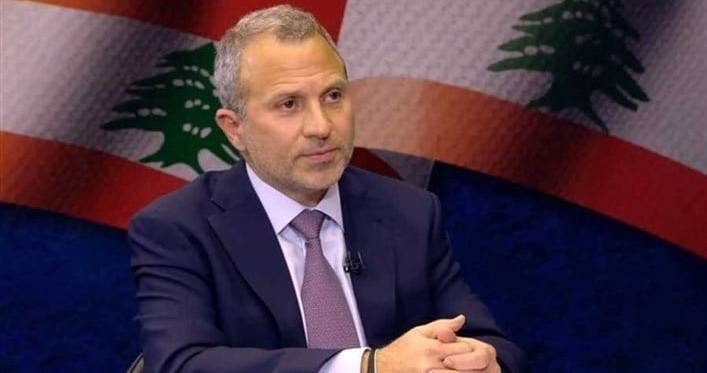
The leader of the Free Patriotic Movement, Gebran Bassil. (Credit: NNA)
Free Patriotic Movement (FPM) leader Gebran Bassil on Saturday criticized a billion-dollar European Union aid package for Lebanon announced during the week, saying the country didn't need money but rather a "political decision" to send migrants back to Syria.
Since the announcement of the EU aid package on Thursday, during a visit to Beirut by European Commission head Ursula von der Leyen, several media outlets and Lebanese officials have likened the funding to a means of "bribing" the authorities to keep Syrian refugees and migrants in Lebanon. A Western diplomatic source denied this interpretation to L'Orient-Le Jour. Caretaker Prime Minister Najib Mikati has also repeatedly denied such assertions.
Lebanon 'not for sale'
Despite these denials, Bassil contended that the EU "prepared an aid package so that Lebanon would prevent migration to Cyprus," whose coastline is very close, and which has decided to turn back all migrants arriving on its coastline.
"The European Commission is fighting against the migration of Syrians to [EU] countries," Bassil said at a press conference, accusing the commission of "a desire to replace the Lebanese people with Syrian refugees, to change the identity of the people and the territory."
"The Lebanese territory and people are not for sale, nor for rent," Bassil continued. "You may be able to buy officials, but not our people and our territory," he added.
According to official figures from the Office of the United Nations High Commissioner for Refugees (UNHCR), there are 1.5 million Syrians in Lebanon, of whom 779,645 are registered with the organization. In 2015, the Lebanese government suspended the registration of Syrian refugees with UNHCR.
Addressing Mikati, the FPM head asked how the billion euros offered by Brussels would be "distributed."
"Is it true that the agreement includes [accepting] the return of migrants turned back by Cyprus?" he asked, adding that Lebanon "doesn't need money, but a political decision for the return of migrants."
"How can you accept a billion euros over four years?" Bassil railed, suggesting that Lebanese officials had allowed themselves to be bought "on the cheap."
"There are vast territories in Syria that can accommodate all the displaced people. If the billion had been paid to the displaced, a large proportion of them would have returned to Syria," he continued.
The Batroun MP urged the authorities to "bang on the table" in order to be heard by the EU and to "implement a plan for the return" of migrants. "The army must close the land borders with Syria, and Parliament must pass a law that requires illegal migrants to be deported to Syria," he said.
A 'calamity'
In addition to Bassil, several MPs from the Forces of Change group also denounced the billion-euro donation to Lebanon, describing it as a "calamity" and arguing that the presence of Syrians in Lebanon requires "a clear strategy and plan, as well as a specific timetable."
"The ruling junta has exchanged the security, stability and future of the Lebanese for 30 pieces of silver," the price for which Judas betrayed Jesus according to the New Testament, MPs Yassine Yassine, Melhem Khalaf, Ibrahim Mneimneh, Najat Saliba, Paula Yacoubian and Firas Hamdan said in a statement. "What happened with the EU is not a success but approaches a national calamity," the statement continued, denouncing the aid as a "bribe" and insisting that the government must instead "develop a strategy to organize the safe return" of Syrians to their homeland.
Lebanon's Forces of Change MPs joined Bassil in criticizing Mikati's statement on Thursday evening that the agreement with the EU also provides for "seasonal" work visas for Lebanese. Bassil denounced a "masked gradual emigration" of Lebanese under this guise, while opposition MPs criticized the fact that this possibility had been raised "instead of undertaking structural reforms that would stimulate the Lebanese economy and create job opportunities for young people."
Unconditional help
Reacting to the many accusations and speculations aimed at his cabinet since the announcement of the billion euros, Mikati, who had already denied any dubious "deal" with the European authorities in a televised interview on Thursday evening, reiterated that the funds are not "a bribe for migrants to stay in Lebanon." These accusations are "unfounded," according to the caretaker prime minister, insisting that "there are absolutely no conditions attached to the donation."
Asserting that the aid plan would be implemented "in a compliant manner," Mikati denounced the statements of those opposing him as an "attempt to derail any attempt by the government" on the matter of Syrians in Lebanon.
The funds offered by the EU are "unconditional aid to Lebanon and the Lebanese," the caretaker premier added, pointing out that this aid would be distributed in particular to the health and education sectors, to support a social security program, and to the army and security forces. Mikati also reaffirmed that his government is "determined" to deport all illegal migrants to Syria. "This issue is indisputable and orders have been given to the competent institutions" to this effect. "Is it in the country's interest to isolate Lebanon from its friends in Europe and the world, and to call into question any laudable initiative aimed at supporting our country?" asked Mikati, who also slammed a "race to populist one-upmanship."
The Lebanese government continues to discuss plans to expel illegal migrants, as well as its desire to deport those detained since April 15, while the international community opposes any non-voluntary return, particularly with regard to political refugees who risk persecution in their own country. Such an initiative would also require the backing of the Syrian regime. From the outset, Syria has expressed its wish to open its doors to its citizens, but insists to this day on having an official interlocutor opposite. In practical terms, this means that Bashar al-Assad's regime is seeking a normalization of relations with Lebanon, a process also desired by Hezbollah, but which deeply divides the rest of the Lebanese people.